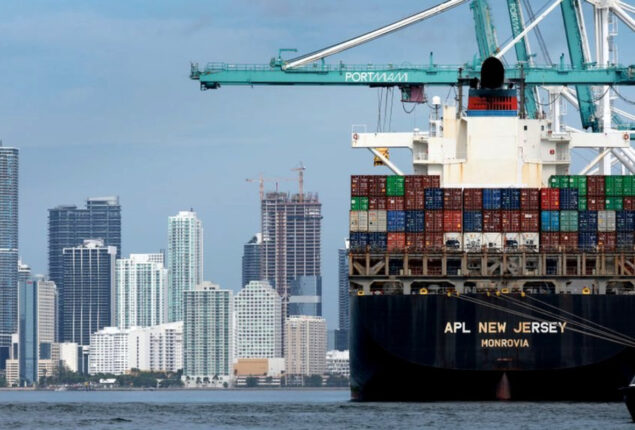Too many gorillas? The great apes’ hunt for space in Rwanda
VOLCANOES NATIONAL PARK (RWANDA) : A huge male silverback gorilla nibbles on a...

Can the Great Lakes fix the United States’ shipping problems?
Lake Erie, one of five linked bodies of freshwater that comprise the Great Lakes system along the US-Canada border, may not appear to be a solution to America’s supply chain problems.
But, as BBC’s Stephen Starr writes, it could be just that.
The Port of Cleveland, which is linked to the Atlantic Ocean by a network of canals and locks, is one of several Great Lakes maritime hubs enjoying a rebirth. The total tonnage handled by the port increased by 69 percent from 2020 to last year. Tonnage in April was double that of the same month in 2021.
“We’re getting a lot more calls from people – shippers, cargo owners – that typically wouldn’t want to consider using a smaller, inland port to move their cargo,” said David Gutheil, chief commercial officer at the port.
With major ports on the east and west coasts of the United States experiencing cargo backlogs as a result of supply chain concerns ranging from China’s Covid lockdowns to Russia’s crisis in Ukraine, shippers are turning to previously overlooked ports to get supplies into and out of the country.
Global shipping corporations were among the first to see the possibilities of the Great Lakes.

To accommodate rising demand, a Dutch shipping operator added another vessel to its Antwerp-Cleveland service in August.
Last November, one ship sailed all the way from Shanghai to Cleveland, a forty-day journey that avoided major ports in southern California, Virginia, and New Jersey that were experiencing backlogs.
Not only are entering foreign freight businesses seeking the Great Lakes ports to handle their goods. The Port of Cleveland is collaborating with a Texas-based company that transports freight from the Gulf of Mexico to Lake Erie, a 1,000-mile trek, in order to send its products to Europe.
“They can’t get vessel or container capacity down there (in Texas),” said Mr Gutheil.
While ports on the Atlantic and Pacific oceans now dominate the American shipping industry, this was not always the case. Throughout the 1800s and 1900s, the Great Lakes ports were an important North American maritime highway for moving agricultural and other bulk materials such as iron ore, coal, and limestone.
However, the Great Lakes ports declined with the deregulation of the rail and, particularly, trucking industries in 1980, as well as the outsourcing of industry to Asia and elsewhere.
All the while, people in the Midwest say they are standing by to help.
As Mr Gutheil put it: “If you have 10 or 20 ports … that handle as much as we do, then you start talking about meaningful change in the supply chain world”.
Catch all the International News, Breaking News Event and Latest News Updates on The BOL News
Download The BOL News App to get the Daily News Update & Follow us on Google News.